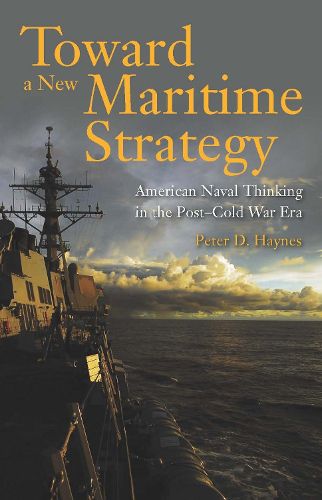Readings Newsletter
Become a Readings Member to make your shopping experience even easier.
Sign in or sign up for free!
You’re not far away from qualifying for FREE standard shipping within Australia
You’ve qualified for FREE standard shipping within Australia
The cart is loading…






Toward a New Maritime Strategy examines the evolution of American naval thinking in the post-Cold War era. It recounts the development of the U.S. Navy's key strategic documents from the fall of the Berlin Wall in 1989 to the release in 2007 of the U.S. Navy's maritime strategy, A Cooperative Strategy for 21st Century Seapower. This penetrating intellectual history critically analyzes the Navy's ideas and recounts how they interacted with those that govern U.S. strategy to shape the course of U.S. naval strategy. The book explains how the Navy arrived at its current strategic outlook and why it took nearly two decades to develop a new maritime strategy. Haynes criticizes the Navy's leaders for their narrow worldview and failure to understand the virtues and contributions of American sea power, particularly in an era of globalization. This provocative study tests institutional wisdom and will surely provoke debate in the Navy, the Pentagon, and U.S. and international naval and defense circles.
$9.00 standard shipping within Australia
FREE standard shipping within Australia for orders over $100.00
Express & International shipping calculated at checkout
Stock availability can be subject to change without notice. We recommend calling the shop or contacting our online team to check availability of low stock items. Please see our Shopping Online page for more details.
Toward a New Maritime Strategy examines the evolution of American naval thinking in the post-Cold War era. It recounts the development of the U.S. Navy's key strategic documents from the fall of the Berlin Wall in 1989 to the release in 2007 of the U.S. Navy's maritime strategy, A Cooperative Strategy for 21st Century Seapower. This penetrating intellectual history critically analyzes the Navy's ideas and recounts how they interacted with those that govern U.S. strategy to shape the course of U.S. naval strategy. The book explains how the Navy arrived at its current strategic outlook and why it took nearly two decades to develop a new maritime strategy. Haynes criticizes the Navy's leaders for their narrow worldview and failure to understand the virtues and contributions of American sea power, particularly in an era of globalization. This provocative study tests institutional wisdom and will surely provoke debate in the Navy, the Pentagon, and U.S. and international naval and defense circles.